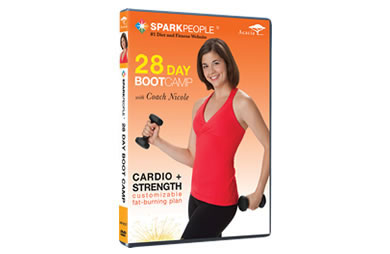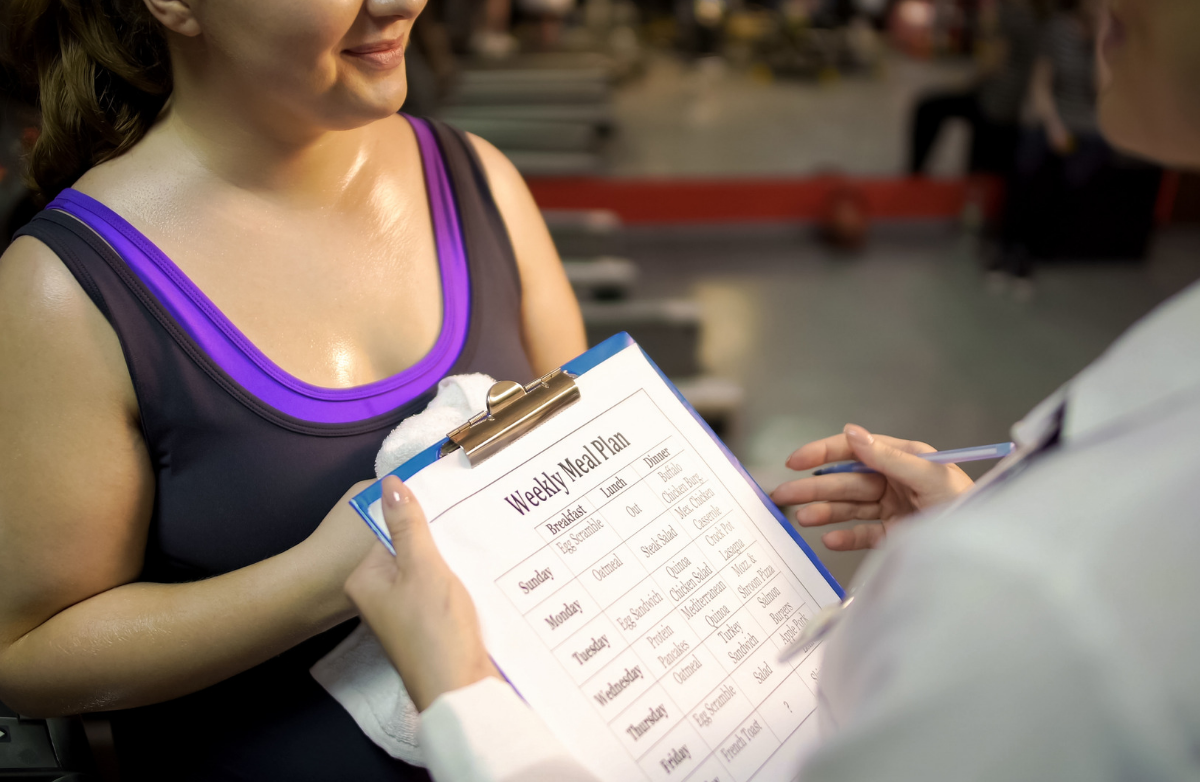|
Who says losing weight is hard? Just a few weeks into your new, healthy lifestyle, you've already dropped a full pants size and your weight loss is in the double digits. You've come to love stepping on the scale, feeling as giddy as a kid on Christmas morning as you watch the pounds melt away. Clothes from the "too-snug" section of your closet are now in your regular rotation, and your goal weight no longer seems as realistic as scaling Mt. Everest. And then, suddenly—nothing. All of that easy-peasy progress comes to a screeching, grinding halt, leaving you baffled. You haven't deviated from the plan. There have been no cheat days, no skipped workouts, not even a covert cookie. So what gives? Why has your body suddenly betrayed you by slamming the brakes on the glory days of weight loss? Welcome to the infamous plateau. "If you’ve been exercising and cutting calories for several weeks, and you’re no longer seeing the same results that you experienced in the beginning, then you’ve probably hit a plateau," explains SparkPeople fitness instructor Nicole Nichols when discussing plateaus in an article on the subject. "This occurs when your progress comes to a standstill, and can be described as not making any 'gains' (such as improving your fitness level or losing weight), but not necessarily moving backward (losing endurance or gaining weight)." What Causes a Plateau?The age-old key to weight loss is to burn more calories than you consume. Taylor Merritt, a certified health education specialist and personal trainer at TITLE Boxing Club in San Diego, sees a lot of her clients experience quick initial success, then get stuck at a certain weight and struggle to get below that number. “The weight tends to fall off more easily at first, because your body is losing water weight from burning stored glycogen,” Merritt explains. When a client gets stuck, Merritt likes to sit down and reassess plan of action. Another common reason for slowing or stalling weight loss is simply falling back into old habits. It’s tough to stick to a nutrition plan and to squeeze in enough activity every day. While it’s completely human to slip up now and then, a regular pattern of “slacking off” in the diet and fitness departments—even if you’re not aware of it—can lead you right into plateau territory. Merritt often hears her clients complain that they’re bored with their current regimen. “Boredom is another major reason to hit a plateau,” she says. “You have to mix up your workouts and/or pick up your intensity. You cannot expect to hit your goals when you are putting in minimal effort. If you want max results, you have to put in max effort. It won't be easy, but trust me, it will be worth it!” How to Deal With a PlateauA plateau can spark a range of feelings, from anger and frustration to sadness and guilt. "The hardest thing for me is the emotions that come along with being stuck for more than a few days," says ZENGIPSY. "I start to feel as though I must be doing something wrong, I start to feel guilty about eating and start to over analyze every bit of food I eat." If you've hit a plateau, know that you're not alone. Many SparkPeople members have shared their stories of stalling, including BED0FROSES. "For six years, I have been unable to make progress," she says. "I remain in the same five-pound weight range with the same measurements. I have tried different fitness challenges, incorporated weightlifting [and] meal plans…but I never break the plateau. Overall my health, fitness and muscle tone have improved, but my problem areas [back and stomach] are disproportionate to the rest of me because those places seem to be the last to go." It's also important to remember that the scale is only one of many different ways to gauge your results. If your clothes are fitting better, you're noticing more muscle definition and you feel generally more healthy and fit, those are signs of physical progress beyond simply shedding pounds. When Sparker TUKARAMA started lifting weights, he noticed that his stomach had gotten smaller from fat loss, his legs and arms had gotten bigger and he had more definition in his chest. "I am redistributing the weight, but not losing much. So the scale can be misleading, if that is your main measurement tool," he says. SparkPeople Members Share Their Favorite Plateau-Busting TipsIf you've hit a weight-loss wall, that's not an excuse to abandon your plan and drown your sorrows in pizza and ice cream. You have the power to make some adjustments, get back on track and bust through even the most stubborn plateau. Try one or more of these recommendations from members who have successfully broken through to the other side. "For six weeks, I was in a serious weight loss plateau that had me confused, frustrated, depressed and desperate. I did not lose one pound, although I knew for a fact that I was staying in my calorie range, exercising religiously six days per week, watching my macros, changing my routines regularly, everything! Well, this past week I had to take a break from exercising because both my arm and leg were injured. I still ate healthy, but increased my calories from 1,500 per day to around 1,800 per day. I got on the scale today, and what do you know...I lost nine pounds! It was like my body was holding onto all of the weight, but it would not let go of it until it knew that it could! When I increased my calories and gave my body a rest from the exercise, my body responded by 'releasing' the weight." SHAXFIEND "This is what I find most helpful: I plan my meals in writing the night before and just eat what I planned. I monitor my eating during the day (check planned food eaten, cross out planned food uneaten, add and circle unplanned food eaten) so I really know what I'm doing. If needed, I track all my food in detail on the SparkPeople nutrition tracker." KRISZTA11 "You need to shake it up. Your body gets used to what you are doing, so you have to change something. If you aren't doing any weight training, add that to your workout routine two or three days per week. Whatever cardio you are doing, do some intervals at an increased pace [instead]. If you pretty much [consume] the same calories every day, eat at the high side of your range (or even slightly over) one day, then the bottom of your range the next day, mid-range the next, etc." OBIESMOM2 "Make every other food you eat a fruit or vegetable to fill you up with less calories and provide fiber. It is a lot of chewing, so you feel like you are really eating something. [When you eat] produce, mealtimes last longer, giving your brain time to register fullness, and it is very easy to make a huge salad with fewer than 500 calories. Go light on dressings and limit or omit cheese, eggs, meat, seeds and other calorie-rich ingredients. Perhaps choose [only] one of those high-calorie/fat-rich toppings, plus a light dressing." SADDHU1 "Mix up your routine with both diet and exercise. If you're doing low-carb, throw in one or two days a week that are high-carb. If you usually stick to the elliptical, move over to the bike or treadmill a couple days a week. Your body gets used to routine and will adjust, so you have to keep it guessing." K80DALY "To break a plateau, I do the following: add more reps, not weight, to strength training sessions; walk/run/bike a different route, including a hill or two, [or]; increase [my] previous [workout] time by 10 minutes." LUVS2BIKE101 "The only thing that helped was completely eliminating sugar for three weeks—I dropped six pounds. However, then I slowly started adding it back in and the weight came right back." ELORA101 "I work out sometime between breakfast and lunch and I set a goal to burn off every one of my breakfast calories or slightly more. This puts me at burning at least 1/3 of my calories daily. It started the scale moving again. It takes commitment and around 90 to 110 minutes a day, but so worth it to see the results. This was after a month of the scale not moving." MELTEA43 "If I am stuck for a week or perhaps a bit more, I cut my portion sizes in half for a whole day. If I typically have two eggs for breakfast, with a bit of cheese, then it's one egg that day, and less cheese. Ditto on the rest of the day. Typically this gets me to lose some weight, even if it is just one day. The next day it is back to my regular plan." -JAMES- "I find that focusing on water really helps me break a plateau, and then adding an extra 10-minute shot of exercise somewhere in the day [helps as well]. [Eating] small snacks with a good mix of carbs and protein also seem to help." TORTOISE110 |
Related Entries
More From SparkPeople
|




.jpg)

















.jpg)